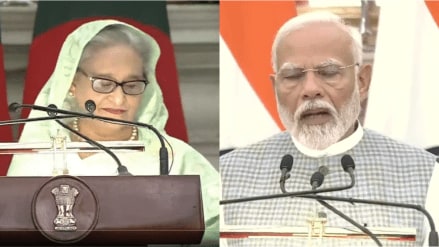India and Bangladesh have embarked on a new chapter of bilateral relations, agreeing to initiate negotiations on a Comprehensive Economic Partnership Agreement (CEPA) and crafting a forward-looking vision to enhance cooperation in various fields. This significant development was announced by Indian Prime Minister Narendra Modi and Bangladeshi Prime Minister Sheikh Hasina after their discussions in New Delhi on Saturday.
Fostering Strategic and Developmental Partnerships
Prime Minister Modi underscored the importance of Bangladesh as India’s largest development partner, highlighting that New Delhi prioritizes its relationship with Dhaka. “Today, a futuristic vision for India-Bangladesh cooperation in new areas was prepared,” Modi said alongside Hasina, reflecting a commitment to broadening and deepening bilateral ties.
Initiating Comprehensive Economic Partnership Agreement (CEPA) Talks
One of the landmark decisions made during the talks was to begin negotiations on the CEPA. This agreement aims to enhance economic interactions, streamline trade processes, and promote investment between the two countries. CEPA is expected to bring substantial economic benefits, fostering closer economic integration and cooperation.
Strengthening Maritime and Blue Economy Cooperation
A notable agreement signed between the two countries focuses on maritime cooperation and the blue economy. This pact aims to sustainably harness marine resources, improve maritime connectivity, and promote economic growth through the blue economy initiatives. This collaboration is crucial for the sustainable development of both nations, leveraging their maritime capabilities.
Enhancing Defense and Security Collaboration
Defense cooperation was another critical topic of discussion. Both leaders agreed to enhance defense collaboration, focusing on defense production and the modernization of their armed forces. Prime Minister Modi welcomed Bangladesh’s decision to join the Indo-Pacific Oceans Initiative, which aligns with India’s strategic vision for regional security and stability.
Advancing Digital and Green Partnerships
The agreements signed also covered digital and green partnerships. Enhanced cooperation in digital infrastructure and technology is set to bolster the tech ecosystems of both countries, while the green partnership agreement aims to promote sustainable development practices, focusing on renewable energy and environmental conservation. These initiatives are designed to benefit the youth and future generations of both nations.
Improving Railway Connectivity
Railway connectivity featured prominently in the talks, with agreements signed to improve cross-border railway links. These enhancements are expected to facilitate smoother transit of goods and passengers, stimulating economic activities in the region. The recent operationalization of the sixth rail link between Jakhoda and Agartala serves as a testament to this progress.
Healthcare Initiatives and E-Medical Visas
In a significant move to improve healthcare access, India announced the launch of an e-medical visa facility for Bangladeshi nationals seeking medical treatment in India. This initiative will simplify the process for patients, ensuring they receive timely medical care. Additionally, India plans to open a new consulate in Rangpur, Bangladesh, to provide enhanced consular services and strengthen people-to-people ties.
Hydrological Cooperation on Shared Rivers
Both countries agreed to commence technical-level discussions for the renewal of the Ganga River treaty. A technical team will visit Bangladesh to review the protection and management of the Teesta River. This cooperation reflects the commitment to managing shared water resources effectively and addressing common hydrological challenges.
Cultural and Sports Diplomacy
Cultural ties and sports diplomacy were also highlighted, with Prime Minister Modi extending best wishes to both the Indian and Bangladeshi cricket teams ahead of their T20 World Cup match. Such gestures underscore the cultural affinities and shared enthusiasm for sports between the two nations.
Looking Forward: A New Era of Cooperation
The series of agreements and strategic vision outlined by Prime Ministers Modi and Hasina mark a significant milestone in India-Bangladesh relations. Modi emphasized, “Connectivity, Commerce, Collaboration – these have been our focus. In the last 10 years, we have restored the connectivity that existed before 1965. We will now focus on digital and energy connectivity even more. This will speed up the economies of both countries.”
As both nations move forward with this shared vision of prosperity and stability, the agreements reached on Saturday lay the groundwork for a robust and dynamic partnership. Underscoring mutual cooperation across diverse sectors, the relationship between India and Bangladesh continues to evolve, characterized by deepening economic ties and a commitment to regional development and security.
Bangladeshi Prime Minister Sheikh Hasina’s two-day state visit to India has thus set a strong foundation for the future of India-Bangladesh relations, ensuring that cooperation between the two countries continues to thrive for the betterment of their people and the region as a whole.
